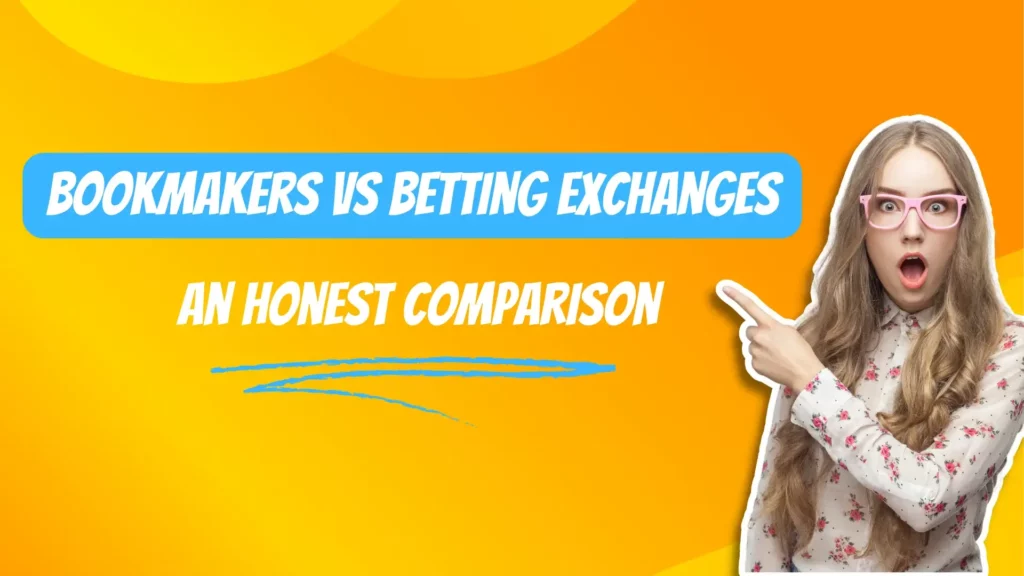There are two types of platforms for sports betting: bookmakers and betting exchanges. While both allow you to wager on sporting events, they work in distinct ways and each has its own set of perks and cons. We’ll look at the distinctions between bookies and betting exchanges in this post so you can make an informed decision about which platform to utilize.

BOOKMAKERS
Bookmakers or “sportsbooks” are the conventional way of betting on sports, in which they set the odds for each event and you can choose to back a specific option.
POSITIVES
- Bookmakers provide a diverse choice of markets to bet on, including mainstream sports like football, basketball, and tennis, as well as niche sports and non-sporting events like politics, entertainment, and current events. This implies that no matter what your hobbies are, there is always something to wager on.
- Bookmakers frequently provide a user-friendly interface, making it simple for even beginner bettors to place bets. They provide straightforward information on the odds, accessible markets, and how to place a wager. Many bookmakers also have mobile apps, making it easy to place bets while on the go.
- Bookmakers frequently offer industry-leading promotions and bonuses to recruit new consumers and maintain existing ones. These can include free bets, deposit match bonuses, and improved odds. These deals can help you get more bang for your buck while also increasing your chances of profit.
- Rich in services: Many bookmakers include services like as live streaming, bet builders, and Best Odds Guaranteed (BOG) that betting exchanges do not.
- Predictable restrictions: Bookmakers have more predictable restrictions than betting exchanges, which rely on public liquidity.
- Bookmakers frequently provide a user-friendly interface, making it simple for even novices to place bets. The majority of bookmakers also have mobile apps, making it easy to place bets while on the road.
NEGATIVES
- Bookmakers make their money by taking a margin on the odds they offer. This can make finding value in the odds challenging, especially for new gamblers.
- Winners are Banned: The vast majority of bookmakers prohibit or ban users who frequently win, making long-term profitability difficult.
- Bookmakers do not provide the same amount of openness as betting exchanges provide. They may not disclose the amount of money being matched on each event, making determining the genuine odds difficult.
BETTING EXCHANGES
Betting exchanges work on a peer-to-peer basis. Rather than determining the odds, they allow users to set their own odds and match bets with other platform users. This means that users can bet either way.
POSITIVES
- Excellent Odds: One of the primary benefits of betting exchanges is that they provide better odds than traditional bookmakers. Users of betting exchanges can set their own odds, which generally results in better odds for the bettor. This is because users compete with one another to offer the greatest odds, which might lead to lower costs.
- Winners Are Welcome: Betting exchanges charge a commission on victories and have no vested interest in users losing. This means that users might frequently profit more on the platform.
- Betting restrictions: Betting exchanges, unlike bookies, do not have betting restrictions. This means you can wager as much or as little as you desire on a specific outcome. Keep in mind, however, that liquidity may be an issue for less popular events or markets, so you may not be able to put as large a bet as you would like.
- Lay Betting: Lay betting allows you to gamble against the outcome of a game. This is referred to as lay betting, and it means that you are betting on a selection to lose. This enables a whole new set of betting methods that were previously unavailable through traditional bookmakers.
- Trading: Betting exchanges allow users to trade their bets, allowing you to purchase or sell a bet based on how the odds change. This can be used to lock in profits or minimize losses, similar to stock market trading.
- Applications from Third Parties: Top betting exchanges offer an API service that allows bettors to link their existing trading tools to the exchange, automating or streamlining their trading process.
- Transparency: Betting exchanges are more transparent than traditional bookies. You may see the current odds for an event, the amount of money matched on each outcome, and the exchange’s commission.
NEGATIVES
- Liquidity is one of the most difficult difficulties for betting exchanges, since it refers to the quantity of money available to match bets. Less popular markets or events may have lesser liquidity, making it difficult to match your bets at the desired odds.
- Betting exchanges can be more complicated than traditional bookies, especially for beginner bettors. They necessitate a thorough comprehension of how the site operates and how to lay bets, which can be perplexing for some.
- Betting exchanges are noted for their high degree of competition because users can offer and match their own odds. There is no guarantee that your bets will be matched at the odds or stake size you specify.
- Premium Charges: The Betfair Premium Charge is a contentious levy that the Betfair betting exchange charges its most profitable users. This runs counter to the “winner’s welcome” policy that draws people to betting exchanges in the first place.
CONCLUSION
To summarize, both bookies and betting exchanges have advantages and downsides.
Bookmakers provide a diverse selection of markets, user-friendly interfaces, attractive promotions and bonuses, and a wealth of features. However, the bookmaker’s margin is high, their restrictions are uncertain, and winners are inevitably barred.
Betting exchanges provide better odds, no betting restrictions, lay betting, bet trading, and increased transparency. However, exchanges can be difficult for newcomers to understand, have frequent liquidity concerns, and are highly competitive.
When picking between bookies and betting exchanges, keep your own tastes and level of experience in mind. If you’re new to sports betting or a casual player, it could be wise to avoid the hazards of trading by using a bookmaker. Alternatively, use the betting exchange exclusively for ‘Back‘ bets.
However, if you’re an experienced bettor searching for better odds and a more profitable atmosphere, a betting exchange is the way to go.
Finally, the choice between bookmakers and betting exchanges should be determined on what provides the most value for your specific aims.













